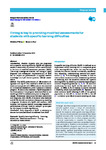Timing is key to providing modified assessments for students with specific learning difficulties
| dc.contributor.author | Gray, Christian | |
| dc.contributor.author | Burr, Steven | |
| dc.date.accessioned | 2020-07-09T17:36:52Z | |
| dc.date.available | 2020-07-09T17:36:52Z | |
| dc.date.issued | 2020-02 | |
| dc.identifier.issn | 2212-2761 | |
| dc.identifier.issn | 2212-277X | |
| dc.identifier.uri | http://hdl.handle.net/10026.1/15961 | |
| dc.description.abstract |
<jats:p>Introduction Medical students who are diagnosed with a specific learning difficulty (SpLD) will typically receive a reasonable adjustment within examinations in the form of modified assessment provision (MAP). This study investigated whether the timing of SpLD diagnosis and subsequent implementation of MAP has an impact on performance in applied medical knowledge multiple choice question (MCQ) assessments.
 Method The MCQ performance of 108 students diagnosed with SpLD who received a MAP was monitored and compared with 1960 students who received an unmodified assessment, over 5 years of a medical program. Students who received a SpLD diagnosis in the latter years of the program were identified as not receiving a MAP in assessments prior to diagnosis.
 Results Differences were found between declaration and diagnosis, with 44.4% of students who declared and 48.1% who did not declare subsequently receiving a diagnosis. Students with SpLD who receive a MAP increase their applied medical knowledge assessment performance, although there is a delay of up to a year for this impact to reach significance.
 Conclusion Early diagnosis of SpLD is necessary to ensure the intended benefit is received from MAP.</jats:p> | |
| dc.format.extent | 49-56 | |
| dc.format.medium | ||
| dc.language | eng | |
| dc.language.iso | eng | |
| dc.publisher | Ubiquity Press, Ltd. | |
| dc.subject | Specific learning difficulty | |
| dc.subject | Learning disabilities | |
| dc.subject | Modified assessment | |
| dc.subject | Timing | |
| dc.subject | Educational measurement | |
| dc.title | Timing is key to providing modified assessments for students with specific learning difficulties | |
| dc.type | journal-article | |
| dc.type | Journal Article | |
| plymouth.author-url | https://www.webofscience.com/api/gateway?GWVersion=2&SrcApp=PARTNER_APP&SrcAuth=LinksAMR&KeyUT=WOS:000512779600007&DestLinkType=FullRecord&DestApp=ALL_WOS&UsrCustomerID=11bb513d99f797142bcfeffcc58ea008 | |
| plymouth.issue | 1 | |
| plymouth.volume | 9 | |
| plymouth.publication-status | Published online | |
| plymouth.journal | Perspectives on Medical Education | |
| dc.identifier.doi | 10.1007/s40037-019-00553-4 | |
| plymouth.organisational-group | /Plymouth | |
| plymouth.organisational-group | /Plymouth/Faculty of Health | |
| plymouth.organisational-group | /Plymouth/Faculty of Health/Peninsula Medical School | |
| plymouth.organisational-group | /Plymouth/Users by role | |
| plymouth.organisational-group | /Plymouth/Users by role/Academics | |
| dc.publisher.place | Netherlands | |
| dc.identifier.eissn | 2212-277X | |
| dc.rights.embargoperiod | Not known | |
| rioxxterms.versionofrecord | 10.1007/s40037-019-00553-4 | |
| rioxxterms.licenseref.uri | http://www.rioxx.net/licenses/all-rights-reserved | |
| rioxxterms.type | Journal Article/Review |


